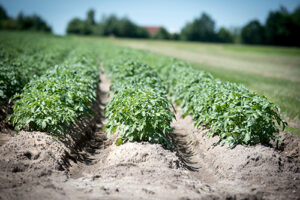Helping rural communities prepare for shifts in biodiversity associated with climate change
 Institutions: University of Maine, University of Vermont and University of Maine at Augusta
Institutions: University of Maine, University of Vermont and University of Maine at Augusta
Sponsor: National Science Foundation
Harnessing spatiotemporal data science to predict how biodiversity and rural communities respond to climate change.
In response to a changing climate, populations of plants and animals move to more hospitable locations. Predicting where species will end up, and how New England farmers and rural communities need to plan for such changes, is the focus of a new interdisciplinary research initiative led by the University of Maine.
The goal is to better understand how plant and animal species — including forest plants, wildlife, diseases transmitted from animals to people, and agricultural crops — will respond to a changing climate in the next century. Data science and modeling will help inform farmers’ adaptation strategies.
The National Science Foundation awarded $4 million over four years to this EPSCoR Research Infrastructure project to develop novel approaches and software for modeling, visualizing and forecasting changes in the distribution of species. The team — researchers from UMaine, University of Vermont, University of Maine at Augusta and Champlain College — will build state-of-the-art models of shifts in species ranges in response to climate change.
The team will assemble and connect diverse data sets to create new tools for predicting the effects of climate change impacts on biodiversity and rural communities. The team’s social scientists will help communities identify effective strategies for adapting to such changes. The project brings together researchers from diverse disciplines including climate science, ecological monitoring, community psychology, and socioeconomics.
Early career and more senior researchers will work with graduate students and postdoctoral researchers across four themes: natural adaptation to climate change; rural community adaptation to climate change; the development of data science tools; and improving public communication of these data. Mentoring will be emphasized, as well as the interdisciplinary sharing of knowledge and skills among team members.
The research will advance data science leading to improved tools that can be more easily used by non-experts. Through a stakeholder-engaged process, researchers will also study how to improve communication of complex data and models by the collaborative development of decision-support tools.
The four-year initiative has multifaceted economic implications for Maine and Vermont, which are both EPSCoR (Established Program to Stimulate Competitive Research) states. It will help create a trained workforce and strengthen research in the high-growth field of data science, including creation of an undergraduate data science curriculum and high school data-science camps. It will also provide insights to help conserve natural resources critical to livelihoods and cultural identity, and help farmers and other community stakeholders better prepare and manage their operations.
Team Leader:
- Brian McGill, professor of ecological modeling, School of Biology and Ecology and the Mitchell Center
Team Members:
University of Maine
- Timothy Waring, associate professor of social-ecological systems modeling, School of Economics and the Mitchell Center
University of Vermont
- Nicholas Gotelli, George H. Perkins Professor of Zoology
- Meredith Niles, assistant professor of food systems
- Laurent Hébert-Dufresne, assistant professor of computer science
University of Maine at Augusta
- Matthew Dube, assistant professor in computer information systems
- Laura Corlew, associate professor of psychology
Resources:
- Brian McGill leads new data science project on range shifts of plants and animals due to climate change (UMaine News, Oct. 15, 2020)
- Project website
